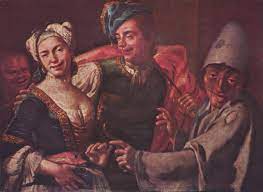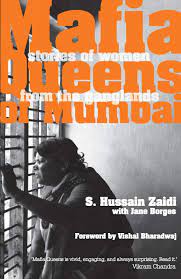“The Rover”& “Mafia Queens of Mumbai” both are such kinds of real incidents which happen in society.so The main object of the comparison of the two texts is to analyze that ‘Prostitution’ is a kind of Taboo in society. So the main objective is to say that Prostitution is Taboo or what? What the society’s people can see in the woman. Who is working under prostitution? If we can think about that you have a mindset of similarity between a Prostitution girl and a House worker woman but you disagree with the statement so I can do research on this topic.
Keywords: feminism, Male Violence, Rap Culture, Mafia, Psychoanalysis,
Introduction

Aphra Behn was an English playwright, poet, translator, and fiction writer from the Restoration era. As one of the first English women to earn her living by her writing, she broke cultural barriers and served as a literary role model for later generations of women authors.
The Rover or The Banish'd Cavaliers is a 1677 play by Aphra Behn. While the word feminist and the theory of feminism was not present at the time the play premiered, there is distinctly a feminist reading to the play, specifically consistent with first-wave feminism.`The Rover or The Banish'd Cavaliers is a play in two parts that is written by the English author Aphra Behn. It is a revision of Thomas Killigrew's play Thomaso, or The Wanderer, and features multiple plot lines, dealing with the amorous adventures of a group of Englishmen and women in Naples at Carnival time.
One of the major storylines in The Rover revolves around the female character Hellena's sexual pursuit of the male protagonist Willmore. Aphra Behn is often viewed through a feminist lens since she was one of the first women in England to earn her living by writing.

S. Hussain Zaidi is an Indian author and former investigative journalist. His works include Dongri to Dubai: Six Decades of the Mumbai Mafia, Mafia Queens of Mumbai, Black Friday, My Name is Abu Salem, and Mumbai Avengers. S. Hussain Zaidi is India's most prolific crime writer. He publishes under the Blue Salt imprint.
Mafia Queens of Mumbai: Stories of women from the ganglands is an Indian 2011 non-fiction crime novel written by Hussain Zaidi with original research by reporter Jane Borges. It tells 13 true stories of women who were involved in criminal activities in Mumbai.
Prostitutions in The Society
According to conflict theory, prostitution reflects the economic inequality in society. Many poor women feel compelled to become prostitutes because of their lack of money; because wealthier women have many other sources of income, the idea of becoming a prostitute is something they never have to consider.
prostitution, the practice of engaging in relatively indiscriminate sexual activity, in general with someone who is not a spouse or a friend, in exchange for immediate payment in money or other valuables. Prostitutes may be female or male or transgender, and prostitution may entail heterosexual or homosexual activity, but historically most prostitutes have been women and most clients men.
(Jenkins, John Philip. "prostitution". Encyclopedia Britannica,)
How does prostitution affect society?

Effects of Prostitution on Society & Individuals. Prostitution contributes to the objectification of women: Just because someone pays does not erase the qualifications of what we consider sexual violence, domestic violence, and rape. However, people who pay for sex tend to think that what they do is acceptable.
Prostitution is A Taboo or what?
So first, we can quickly move on to the topic that Prostitution in the Rover and the Mafia Queens of Mumbai concerning the article.
Historical context
Cavalier revelries under Charles II regained the notoriety of their pre-Cromwellian counterparts. Britain’s king led his noblemen by example with a hedonistic lifestyle of parties, sex, and extravagant spending. The social and sexual freedom of this “libertinism,” however, did not extend to ladies. Although women might crave higher degrees of autonomy and sexual expression, their lives still fit within the boundaries of three roles: nun, prostitute, or wife. Between the categories of “virgin” and “whore” lay avoid, not a spectrum; one could give “the whole cargo or nothing” (Behn 164). (Ellen T. Goodson
My Interpretation of the Historical context is that the people of the puritan age at that time were living like most of the Hedonistic lifestyle. Those who are coming from the richest class were having this kind of freedom so I mean to say that the Rover is a kind of play that people are enjoying their lifestyle without any rules and regulations so the characters like Blunt, Bellville, Fredrick, Willmore, etc.
Each woman begins the play bound one of the three fates: Florinda to marriage, Hellena to the nunnery, and Angellica Bianca to well-paid prostitution. Through Carnival, however, these women abandon their prescribed positions with disguises to “be mad as the rest, and take all innocent freedoms,” including to “outwit twenty brothers” (Behn 138-139). The masquerade serves multiple purposes. First, disguise equalizes the class distinctions, “[blurring, criticizing] and…even [satirizing] the difference between the categories available to women” (Kreis-Schenck 160). When lost in the festivities, the ladies join all that “is or would have you think they’re courtesans,” the most sexually liberated women (Behn 142). Their initial costumes as gypsies allow them to approach men in a feminized, desirous way. Gypsies already occupy the role of an outcast on the liminal edge of society; by taking on their looks, Florinda and Hellena put themselves and their sexuality outside the confines of cultural expectation. Their decision implies Behn’s opinion that her peers should seek to escape the restrictions that define them.
If we can read this paragraph so we can easily get the idea that prostitution is a kind of big task that a prostitutional woman is doing in the world. So we can give one kind of metaphor about what prostitutional women are in society's male dominance. 
So, here in this, I use Angelica is a kind of two Rupees pen means that you might get the idea that those women are working on Prostitution. Who might be facing like use and throw? so the two rupees pen is one kind of metaphor of the Prostitutional Girl. sob in the Rover characters like Willmore and his friends are having continually prostituting the women.
|
When she and her maid realize Willmore is courting Hellena, Angelica confronts her unfaithful lover and then tries to convey her pain to Moretta
Moretta. What could you expect less from such a Swaggerer?
Angelica. Expect! As much as I paid him, a Heart entire,
Which I had pride enough to think when e’er I gave It would have raised the Man above the Vulgar,
Made him all Soul, and that all soft and constant. (3.1.144)(María Teresa)
So, These are the original Dialogues by our Protagonist character Angelica that when she realized that Willmore has used Angelica then she feel some guilt on the Willmore so the understanding of these lines means that The dichotomy depict in the lines that Male is always free to do anything in ṭhis world woman is like a skeleton, Pinjar, Prisoner. If any woman has sexual relations sheep with any other male so definitely she will become part of Prostitutional Girl.
Angellica Bianca, who is, by all definitions, a whore, is Hellena’s rival and a character who confuses all the norms of masculine society. She has the advantage of being in control of her body. It is she who actively engages the men’s interest and names the price. The men have no choice but to pay what she asks. By having Angellica put up her picture and then look at the men looking at it, Behn, as Hutner (1993) notes, employs the “reversed double gaze – watching the men watch her” (p. 107). Angellica purposely submits herself to objectification, with an awareness of how the men will gaze on her.
Later on, though, Angellica attempts to avenge herself on Willmore. With a gun in her hand, Angellica assumes a masculine role, but she is unable to kill Willmore and is rather disempowered by having Antonio remove the gun from her hand and being led away. Willmore’s nonchalant attitude towards her rage, too, serves to undermine her power. The whore Angellica is cast aside at this point to make way for the virgin Hellena. The issue of the success of one woman over another in gaining a man, however, is problematic in the sense that Angelica's failure may be attributed to her immoral life and Hellena’s success to her virginity, virtues, and noble birth, factors or standards which have already been set by a masculine society. Once again, thus, the deciding agent becomes men which suggest that female empowerment is temporary. (Arifa Ghani Rahman)
My point of view is that we can justify the character of Willmore. Who is the protagonist character in the play but the argument saying that our hero is not Willmore but angelica, can see the Angelica is a kind postfeminist lens that she suffered a lot in their life because she is prostitute girl, who is making sexual relation sheep with any man. Who has the power of money because in this material world money is Everything?
⇱⇲ Willmore
⇆⇌ Hellena
At last, Angelica wanted to shoot Willmore because she can not do that because she can't take revenge so here we can see the pure & kind heart of the woman.
Well researched, this book is a tribute to the women who have mIt couldn't get feistier than this you think on reading the title and immediately conjure up images of gorgeous molls lolling on the arms of cigar-puffing villains sporting mismatched shoes. But Mafia Queens of Mumbai: Stories of Women from the Ganglands is nothing like what you'd expect. A cool clinical tribute to the women who made significant inroads into the infamous arena of Mumbai's criminal underbelly, the extensively researched work of journalists S. Hussain Zaidi and Jane Borges, besides enlightening one on the ways of lady gangsters, informs, enthralls, and very frequently chills the reader down to his bone marrow. made significant inroads into Mumbai's criminal underbelly. (Kankana Basu)
So, In this, we are going to discuss the story Gangubai. There are several kinds of stories but we can discuss one famous nonfictional story of Gangubai is one of the prostitutional women but she does not actually come in this occupation but unfortunately, her husband sold gangubai in this redlight area John. The quality of gangubai is trying to tribute that who are interested they can join or there is no need for this work.
Psychoanalytic criticism in literature, based on the theories of psychoanalysis, by the Austrian neurologist, Sigmund Freud have been instrumental in exploring the dark vistas of the characters‟ minds and interpreting the text for many years. It works on the concept of the unconscious or repressed desires which, when comes to surface has, helps in the healing process of the individual psychological distress and complexities. He further develops his theory by introducing the notions of id, ego, and superego, the three elements in the personality of an individual. In „Mafia Queens of Mumbai‟, we come across some women characters, who can be examined under the light of this theory. (Sompurba Basu)
So, we can get the concept of the Mafia Queens of Mumbai is not some kind of Criminal story of the woman but it has the surface of reading and analysis of the feminism and Psychoanalysis perspective. So the gangubai is one of the great examples of prostitution women.
Conclusion
Thus, we can argue that the work of prostitution is not taboo but the way of seeing Prostitutional girls is incorrect, so the further we can say that The character of Angelica & Gangubai do not come willingly but some atrocity of the male dominance though they are keeping in this kind of Prison of Prostitution. So After doing research pf these two texts we have to change our perspective of the Prostitute woman. So We can agree with the title that prostitution is not Taboo but it's helplessness so by force they are coming into this work which is taboo for society but it’s not actually taboo Am I right? Give your opinion about the analysis of my write-up and give a valuable response or comments.
Bibliography
Goodson, Ellen T. "Aphra Behn's "The Rover": Evaluating Women's Social And Sexual Options". Inquiries Journal, 2021, http://www.inquiriesjournal.com/articles/1695/aphra-behns-the-rover-evaluating-womens-social-and-sexual-options.
Basu, Kankana. "Queens Without Crowns". The Hindu, 2021, https://www.thehindu.com/books/queens-without-crowns/article2420664.ece.
Basu, Sompurba. Druckhaus-Hofmann.De, 2021, https://www.druckhaus-hofmann.de/gallery/15-wj-april-2199.pdf.
Rahman, Arifa Ghani. "Download Files From The Web". Support.Microsoft.Com, 2021, https://support.microsoft.com/en-us/windows/download-files-from-the-web-abb92c09-af3a-bd99-d279-a89848b54b0b.
Hobby, Elaine. "British Library". Bl.Uk, 2021, https://www.bl.uk/restoration-18th-century-literature/articles/the-rover-an-introduction.
Thanks😊




